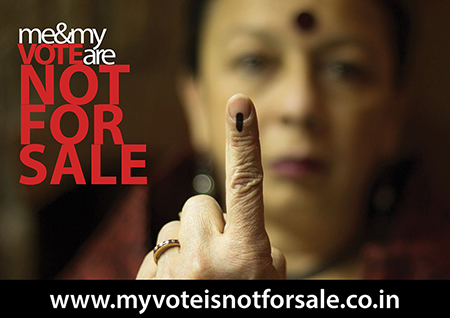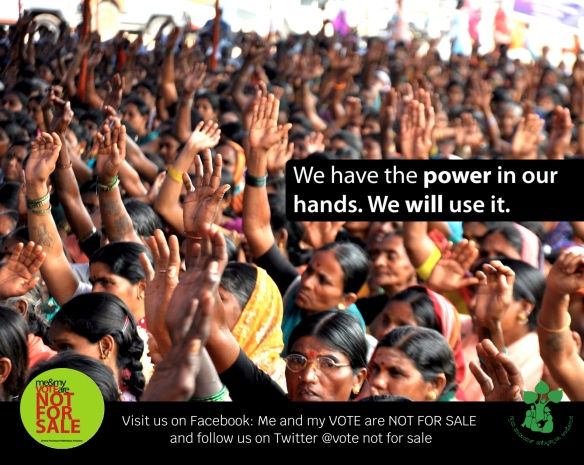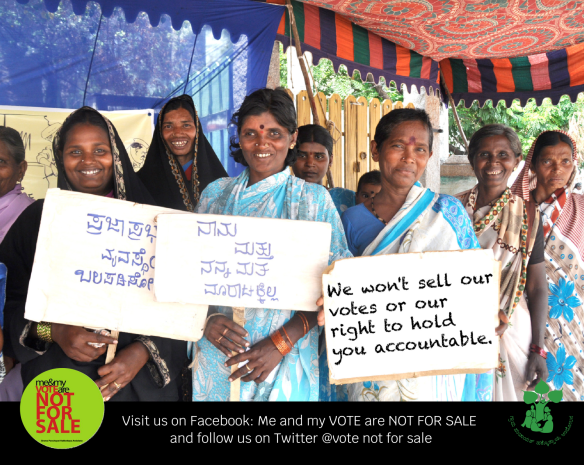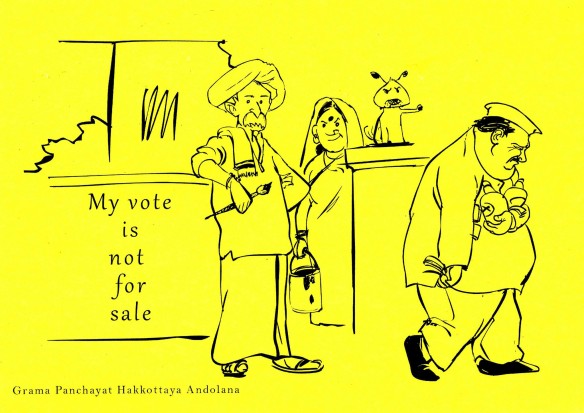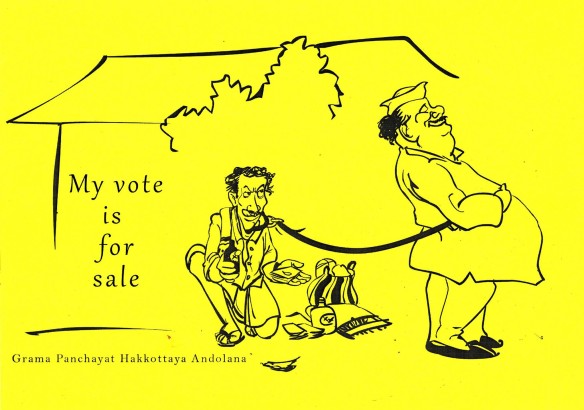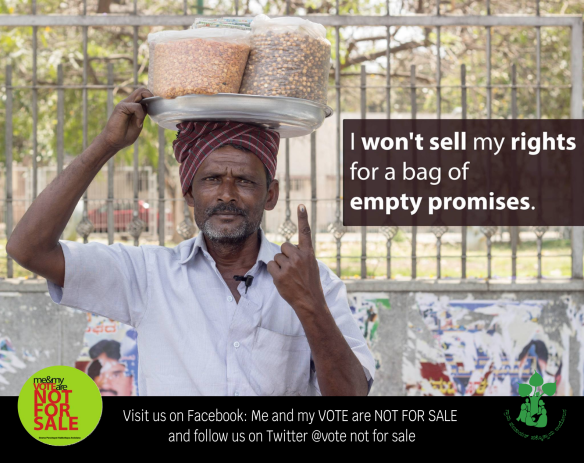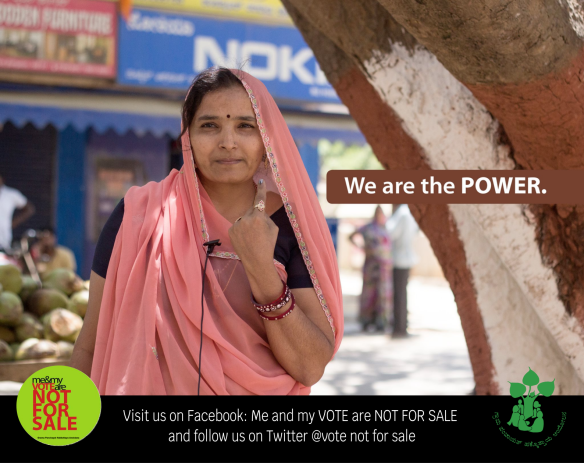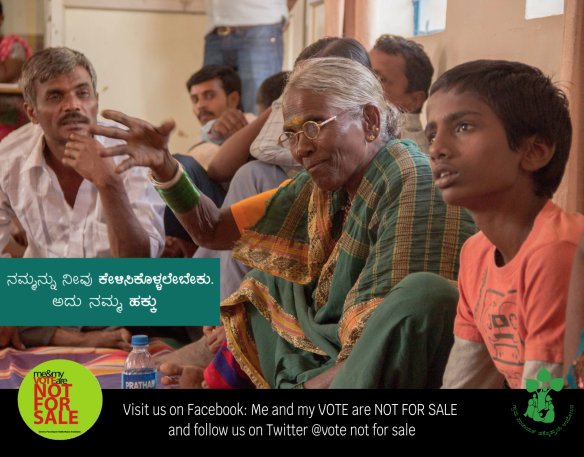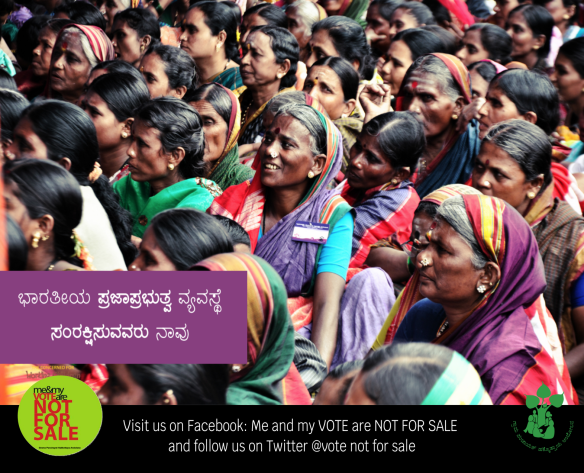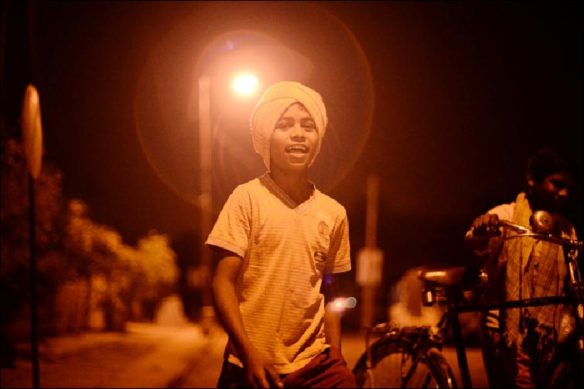Me & My VOTE are NOT for SALE: Overview of the Campaign
Posted on March 07, 2019
Does my honest, non-corrupted vote really count? The two lakh people impacted by the ME & MY VOTE ARE NOT FOR SALE campaign prove that it does! This powerful campaign was spearheaded by the Grama Panchayat Hakkottaya Andolana (GPHA). Its call is that WE, the CITIZENS and the VOTERS have the power to effect change if we vote with integrity – keeping at the forefront rights, development, and social justice to all in the nation. The campaign takes a bottom-up approach by reaching out to those who have often been forgotten: the marginalized groups, rural populations, women, and youth.
SNAPSHOT OF THE ‘ME & MY VOTE ARE NOT FOR SALE’ CAMPAIGN
The ME AND MY VOTE ARE NOT FOR SALE campaign celebrates the honour of the voter. It empowers each one of us as citizens to reclaim democracy. From its launch in the 2010 gram panchayat elections, the campaign has achieved several milestones. It was utilized towards campaigns in the 2014 assembly elections and was undertaken with full vigour in the 2018 Karnataka state elections.
Use of the campaign during the 2018 Karnataka state elections garnered the support of various sections of society, from individual families and businesses to entire communities and gram panchayats, as well as district administrations themselves. Children, youth, marginalized communities, and women have been very active participants and promoters of this campaign. Examples of this include the manifestos presented by the Bhima Sangha (Working Children’s Union) and Migrant Labour Union to each major political party.
To spread both their demands and awareness of the campaign, the Bhima Sangha organized bike rallies around their localities in both 2014 and 2018. They went door to door dialoguing with people, giving out stickers and spreading their message. The campaign in 2014 received coverage across the state. Several rallies were organized as part of it, including a bike rally, Padyatra, and cycle Jatha. The campaign was endorsed by candidates, opinion-makers, and celebrities.
The 2018 cycle Jatha was held on April 30th, 2018 (which was both National Child Labour Day and the 28th anniversary of the Bhima Sangha). The purpose was to garner support for their manifesto and further the call of the Honourable Voter’s campaign. The rally was covered by the news channel Mirror Now, along with a small discussion of the campaign itself. Also in 2018, a bike rally was organized by the Migrant Workers’ Union in collaboration with SVEEP, as part of the ME AND MY VOTE ARE NOT FOR SALE campaign in Udupi district.
The campaign has garnered active participation from students at several colleges in the Udupi and Bangalore districts. Till date, more than 20,000 people across 46 gram panchayats in the Udupi and Bellary districts alone have pledged allegiance to the campaign. The State and National reach of the campaign is more than two lakhs people.
It has prominent presence in seven districts, of Bangalore, Chamarajanagar, Udupi, Davangere, Bellary, Mysore, and Daskhshin Kannada. The Udupi, Bellary, Chamarajanagar and several district administrations have become key partners and active promoters of the campaign – especially through their SVEEP programme. Several state NGOs and rights’ activists have also adopted and furthered the campaign.
The ME AND MY VOTE ARE NOT FOR SALE campaign is hosted by the GPHA, movement for self-determination of local governments, and the Concerned for Working Children organization (CWC).
THE EMERGENCE OF THE ME AND MY VOTE ARE NOT FOR SALE CAMPAIGN
The GPHA is a movement of representatives of grama panchayat and gram sabhas of Karnataka state. It is devoted to secure and safeguard the provisions of democratic decentralisation and devolution of power enshrined in the Constitution. The movement serves to strengthen these institutions, especially at the grassroots level, by empowering the people’s representatives to become effective instruments of development and social justice. The CWC, a secular, democratic private development agency that has been thrice nominated for the Nobel Peace Prize in 2012, 2013, and 2014 for its work in child participation, is the secretariat of the GPHA. The GPHA plays a pivotal role in strategising and acting to uphold the rights of gram sabhas and the powers of local governments. The movement also facilitates local governments to play a proactive role in promoting and nurturing vibrant civil society participation.
In order to preserve the integrity of the gram panchayat elections in Karnataka, the GPHA launched the ME AND MY VOTE ARE NOT FOR SALE campaign in 2010. The rationale behind this campaign was fortified by the following realizations:
- Money and political power were disabling the only tool that villages had for direct participation in governance, i.e. the gram panchayat. Most of this money was being used by political parties to buy votes and to buy out unethical candidates.
- Genuine consensus candidates, who were honest representatives of the people and were closely committed to the issues faced by their gramas (villages), could not afford and refused to engage in money politics. They were not taking part in gram panchayat elections anymore. This paved the way for contractors to field candidates for their economic interests, as well as political appointees whose mandate was to fulfil the agenda of their political parties, rather than facilitate fair and participatory governance of their constituencies.
- This led to deep-rooted voter disillusionment, or the belief that no matter who they voted for, voters’ rights and development were likely to be compromised. Voter apathy, i.e. the sense that one’s vote will not make a difference, kept a majority of the thinking votes out of the fray and fueled vote buying.
- This grave reality exists in any election, including the state and national elections.
- The GPHA strongly believed that the solution to this was not in new legislation, amendments, or court directives to governance and administrative agencies. Rather, there was a strong conviction that voters needed to take charge of demanding accountability from candidates (before elections) and elected representatives thereafter. People understood that they had a right to vote for development, justice, and welfare. By UPHOLDING THE SANCTITY OF THEIR VOTES they were NOT SELLING THEIR RIGHTS.
The ME AND MY VOTE ARE NOT FOR SALE campaign focuses on strengthening the commitment and voice of the INDIVIDUAL CITIZEN, and by doing that, ensuring that the integrity of the supply side is automatically strengthened.
WHAT IS THE ME AND MY VOTE ARE NOT FOR SALE CAMPAIGN?
The campaign strategy is to, in a thought-provoking and forceful manner, facilitate the following:
- MY VOTE MATTERS
Develop consciousness and conviction in individual citizens that our VOTE is our right to demand for our development and security.
- OUR COLLECTIVE VOICE MATTERS
Create collective platforms to debate, dialogue and demand accountability from current administrations and future candidates, both before and after the elections.
THE CAMPAIGN UNFOLDING – WHAT WE HAVE ACHIEVED
The campaign elicits dialogue, even arguments, but most importantly it evokes thought and commitment around the understanding of how important each vote is. The importance lies in our own interest and in the interest of our community, state and nation.
- MY VOTE MATTERS
Thus as part of our efforts to reach out to every individual, the strategy was to knock on doors – of houses, shops, institutions – and through dialogue and deliberation affirm that voting is our right and that voting with integrity is our responsibility and to our benefit.
We offered two stickers / badges with cartoons depicting the following 2 scenarios:
Sell my vote and sell my ability to demand my rights and privileges v/s Don’t sell my vote, thus keep my rights and privileges. I am making myself a slave to the politician. I am making the politician accountable to me. The campaign team focuses on ensuring an informed and conscious choice. Thus, a person would have to buy a sticker for Rs. 2, rather than get it free. Further, they had to display it on the front of their house, shop etc. The above stickers are very thought-provoking and have consistently evoked rights-based discussions. People recognise that by receiving small material gains, they have given up the right to demand the fulfillment of even their most basic rights.
If in a village a large number of households sport the MY VOTE IS NOT FOR SALE sticker, then a large banner is put outside the panchayat office stating that this village/community is not for sale. Further, three waste baskets would be put in front of the Gram Panchayat with three crossed-out posters on each of them containing images of: Sarees, Money and Liquor.
This is done to illustrate that the people of this village/urban community are not willing to accept bribes and they should be dumped in the baskets. This sends out a strong message to the candidates: that the people want real commitment from candidates towards the development and welfare needs of the entire village/community and each person within it. Further, they want to have a say in their development and thus are holding on to their right of making their elected representatives accountable.
This model has been replicated in the Assembly Elections of 2014 and the State Elections of 2018. It is also relevant for future elections, such as the General Elections due in 2019.
- OUR COLLECTIVE VOICE MATTERS
During the past three elections, the campaign received the backing of various sections of society: individual families and businesses, entire communities and gram panchayats or district administrations themselves. Children, marginalized communities, and women have been active participants and promoters of this campaign.
CHILDREN AND YOUTH PARTICIPATION
Some of the focal stakeholders in the campaign are children and youth. There are several instances of deep commitment and adoption of the campaign by our young citizens, be it child labourers and children from migrant and marginalized communities (through the Bhima Sanghas – Union of Working Children), children from the gram panchayats in the rural areas (through the Makkala Sanghas), or young students from colleges across Udupi district and Bangalore. They are actively going out on the streets and dialoguing with people, giving out stickers, and ensuring the message is spread.
In the Udupi district alone, students from several colleges participated in sessions of the campaign. Students from Milagres College took an oath to do their part in voting responsible and ensuring clean elections. Students from Padukere College responded very positively to the campaign, stating that they would take it forward and introduce it in their respective villages. Colleges in Bangalore are also being reached out to. Students from the Vaikunta Baliga Law College, Varadharaj M Shetty Government College, and the Shankaranarayana PU college have participated in Honourable Voter rallies and/or door-to-door campaigns. Engineering students from SJBIT College at the University of Bangalore engaged with the campaign by emphasizing the need to vote and work towards corrupt free elections, and stating that they would spread the campaign in their homes and communities.
April 30th, 2018 marked National Child Labour Day and the 28th anniversary of the Bhima Sangha (Working Children’s Union). The members of the Bhima Sangha of Bangalore, facilitated by CWC, accordingly held a cycle rally to raise the call of ME AND MY VOTE ARE NOT FOR SALE. Their focus was to promulgate and get support for their manifesto and to demand for effective, accountable candidates who can ensure their rights as equal citizens. Children stopped at points along the route to discuss the campaign with shop keepers, street vendors, and members of nearby households.
MANIFESTO DEVELOPMENTS – FORMALISING THE DEMAND FOR THEIR RIGHTS!
During the 2018 campaign, as in the past, the Bhima Sangha and Karnataka Construction and Migrant Workers’ Union, facilitated by CWC, prepared their manifestos, presented and discussed them with Mr. P.G.R. Sindhia (Chairperson, Manifesto Drafting Committee, JDS), Mr. Suresh Kumar (Chairperson, Manifesto Drafting Committee, BJP), and Mr. Khurshid Ahmed (Indian National Congress).
The manifestos of Bhima Sangha and the Migrant Union received a positive response from representatives of all three parties, who ensured they would discuss the manifesto with other members of the drafting committee. It is a tremendous symbol of what we may think of as ‘ignorant, illiterate or indifferent citizens’ understanding of democracy.
The inputs from several consultations with Bhima Sangha over the past few years found space in the children’s manifesto. It was compiled by the Karnataka Child Rights Observatory in participation with various organizations working in the field of children’s rights. The manifesto was presented to members of JDS, Congress, and BJP, who gave assurance that they would discuss it in their drafting committee.
The manifesto highlighted the need for adequate protection measures in their work space, for flexible schools, and the need to be consulted while framing policies that are relevant to them. As a substantial number of Bhima Sangha children are from migrant communities, in addition to the section on their demands as working children, their manifesto also contains their demands as members of migrant communities.
The Bhima Sangha manifesto talked about children’s rights to playgrounds, a safe and clean water supply, primary health centres, ‘Child Rights Ward Sabha’, toilets, and protection from street dogs, floods, and other dangers. The need for participatory platforms in urban as well as rural areas is also highlighted in the manifesto. It was accepted as an alternative state manifesto by the civil and urban experts present.
Further, CWC’s contributions (as the secretariat of GPHA) on rural governance became part of the civil society manifesto, compiled by the organization CIVIC. This was formulated with inputs from over 80 organizations. Drafting committee members of AAP, JDS, CPIM, Congress, and BJP were presented with the manifesto. Their commitment was elicited to work on incorporating the demands for development and social justice in their own election manifestos.
The collective decision at the end of the consultation was that civil society organizations who were present will collectively develop a yearly scorecard for political parties in power, the opposition, and elected representative, to hold them accountable to their promises. In May 2019, Samaja Mukhi will produce a magazine issue highlighting the scorecard.
WOMEN AND THE CAMPAIGN
In the past (2010)700 women contested and got elected to the Gram Panchayat on the strength of the ME AND MY VOTE ARE NOT FOR SALE campaign. The active participation of women in the campaign has continued in the 2018 leg too. Several Anganwadi and Balwadi Workers actively engaged in spreading the message, especially in Bellary.
Thus the campaign has engaged and continues to reach out to marginalized communities, be it youth, women, or rural villages. It tells them that they have the power to effect change if they vote with integrity, keeping in mind rights, development and social justice.
COLLABORATIONS WITH DISTRICT AND LOCAL GOVERNMENTS
The Campaign has been endorsed and adopted by several district administrations in Karnataka. In fact, the Udupi, Bellary, and Chamarajanagar districts and district administrations have made CWC, the GPHA, and other campaign partners their key partner under the Systematic Voters’ Education and Electoral Participation (SVEEP) programme. They have jointly launched the ME AND MY VOTE ARE NOT FOR SALE campaign in their constituencies.
In Bellary, the SVEEP committee (which consists of officials from the Department of Panchayati Raj and Rural Development, Department of Labour, DWCD, and others) have partnered with GPHA and CWC workers to conduct sessions with the anganwadi and ASHA workers, the KISHORI groups (female youth and adolescent girls’ groups that have been formulated under the aegis of the Department of Women and Child Development) and the Mahila SHGs (women’s groups that have been formulated under the aegis of the DWCD) of the district.
The SVEEP committee of Bellary and CWC have also jointly launched house-to-house and village campaigns. A procession was held at Huvenahadagalli Taluk Panchayat in the Bellary district to highlight the campaign, which saw the participation of the Taluk Panchayat Executive Officer, members of the town municipality, and several residents and students from nearby colleges.
The Udupi administration, as well, has printed and supported all campaign materials for the district. The SVEEP committee of Udupi, in conjunction with CWC and GPHA members, have facilitated the campaign at railway stations, bus stands, market spaces, and other public spaces.
In 2018, a bike rally was also organized by the Migrant Workers’ Union in collaboration with SVEEP, as part of the ME AND MY VOTE ARE NOT FOR SALE campaign in Udupi district. The rally was flagged off by Mr. Roshan Shetty, the Assistant Director of the Department of Youth Empowerment and Sports and member of the systematic voters’ education and electoral participation committee.
OTHER KEY PARTNERS
In several places in Karnataka, the ownership of the campaign has been taken over by community-based organisations and other NGOs. BREADS, an NGO active in North Karnataka, has taken the campaign to 18 taluks and 102 districts (Bangalore, Bellary, Bidar, Chitradurga, Davangere, Gulbarga, Mysore, Raichur, Ramnagara and Yadgir) through their Child Rights Education and Action Movement program.
A consultation on the campaign took place in Bangalore, including the Human Rights Advocacy and Research Foundation, Global Concerns, an activist from the Dalit Bahujan Movement, the Association for Promotion of Social Action, and students from St. Aloysius College. Each were very keen to take the campaign back to their respective areas of work.
Similarly, Niranthara foundation has actively promoted the campaign’s cause in the Mysore district and the Chamarajanagar District NGO Federation has taken ownership of facilitating the campaign in Chamarajanagar district. The campaign’s call has also been taken up by several Dalit, women’s, and community-based disabilities organizations, amongst others. The Federation of Persons with Disabilities along with EO and CDPO in the Bellary district organized a bike rally of their own to support the campaign.
In Bangalore, Global Concern has taken up the ME AND MY VOTE ARE NOT FOR SALE call with its strong reach in the Ejipura and surrounding slum communities.
PRINT AND MEDIA COVERAGE
Over the years, the ME AND MY VOTE ARE NOT FOR SALE campaign has received active support from several local and national print houses. It has been repeatedly covered in pan state and national newspapers such as Prajavani, Udayavani, Vijaya Karnataka, The Bangalore Mirror, The Hindu, Times of India, and The Deccan Herald. Hosadigantha, a Kannada newspaper, published several articles on the campaign as part of their series on ‘Inclusive, Accessible and Ethical Elections’.
Since the launch of the campaign in 2010, it has received the backing of national and private media houses. A few notable examples are: social media reach, community radio transmission in 63 villages, broadcast on AIR, series broadcast of social impact messages on Doordarshan, support in the season 2 episode of Satyameva Jayate on Star Plus in India and exclusive video on the Satya Meva Jayathe website (vote for change – 1,23,96,133).
- Link to the episode on ME AND MY VOTE ARE NOT FOR SALE featured in Satyameva Jayate: https://www.youtube.com/watch?time_continue=6&v=O-zfzzIZ8-Y
- Link to the feature on news channel Mirror Now in April 2018: https://www.facebook.com/MirrorNow/videos/1278177872317030/
- Links to the campaign and its impact during earlier elections: http://gpha.weebly.com/main-page-voters-campaign-2014.html http://gpha.weebly.com/324632723250326332233250327732503265322332513265.html
- Link to our Facebook page on the campaign: https://www.facebook.com/Me-My-VOTE-are-NOT-for-SALE-435686833231455/
OUR CONVICTION
This campaign is not just about a few events, dynamic discussions, or commitments at face value. The aim is to plant a conviction deep into all our minds: that we matter and our vote counts. Each and every one of us is a discerning, valuable citizen of our state and our nation. It is our responsibility and right to ensure that our voice is heard and that our integral, honest vote is factored.
The aim is then to create a movement around this thought – a movement for the long haul, not only the upcoming 2019 national elections but ongoing thereafter. The aim is to consistently demand integrity and efficiency both from the present elected representatives and future candidates.
In the future, the aim is to use the Honourable Voter’s Campaign to ensure clean and fair Indian General Elections, 2019, as well as each election thereafter!
Join us today!
https://www.facebook.com/
or follow us on twitter @votenotforsale
